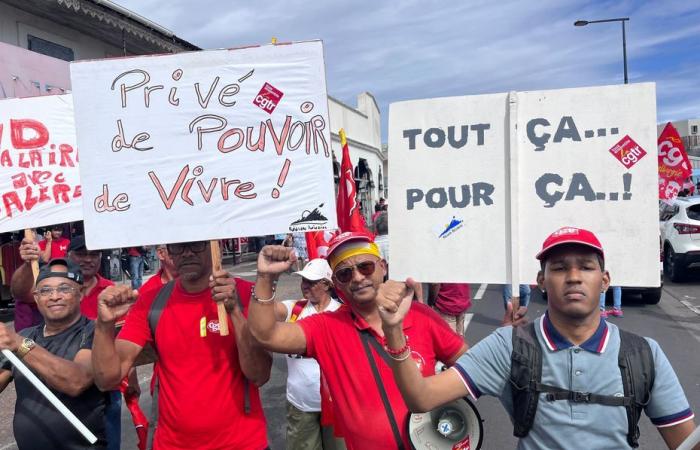
Mobilizations against the high cost of living are increasing in Overseas Territories and in Paris, in Reunion a COSPAR II is being discussed. Could the social movement of March 2009 happen again there? Unions and politicians are considering it. It remains to be seen whether the population of Reunion will follow, as in Martinique.
Is a COSPAR II possible? While the high cost of living remains relevant in the Overseas Territories, is a mobilization such as that of 2009 in Reunion Island possible again? In Martinique, the population has waged a long fight since last September.
In March 2009, the people of Reunion mobilized massively against the high cost of living, as in the West Indies. Thousands of people marched in the streets of Saint-Denis, responding to the call of COSPAR, the Collective of trade union, political and associative organizations of Reunion, to demand an increase in wages and a reduction in prices on food products. first necessity.
The movement had found a favorable outcome, with the implementation of advances such as the creation of the Price-Quality Shield or the salary increase for workers earning less than 1.4 times the minimum wage. This COSPAR bonus, born from an agreement between the unions and Medef on May 25, 2009, will only last three years.
However, the problem of high cost of living remains relevant, particularly in overseas territories. In Martinique, the population has been mobilizing again since last September. A movement, marked by urban violence, which allowed the conclusion of a protocol. The people of Martinique have obtained the abolition of VAT until the end of 2027 on a list of essential products, and the commitment to reduce prices by 20% on average.
Beyond Martinique, all overseas territories are affected by the high cost of living. This Sunday, November 3, thousands of demonstrators, from the West Indian, Reunionese, Caledonian and even Mahorese diaspora, marched in Paris.
A fight also brought before the National Assembly. An amendment adopted in 1era reading by the deputies, on October 26, plans to abolish VAT on all products in the five overseas departments.
” The cost of living situation is more or less similar throughout the Overseas Territories. And the population today suffers enormously from a lack of purchasing power, high prices and exploding bills. “, estimates Jean-Hugues Ratenon, MP for Réunion and COSPAR figure in 2009.
For the member of Reunion Island, facing the ” social planing “of the Government, the population must enter into a balance of power.
I think it is important that the men and women of the country mobilize, that there is this momentum throughout the Overseas Territories, with trade union organizations, with politicians, with associations, collectives, friends also with the citizens, with the population in general.
Jean-Hugues Ratenon, deputy for Réunion
Without mobilization, no discussion and therefore no progress, this is essentially what Jean-Hugues Ratenon transcribed from his meeting yesterday, Monday November 4, with the Minister responsible for Overseas Territories, Jean-Noël Buffet.
In Reunion, after the call from unions to demonstrate in defense of purchasing power on 1is last October, a new mobilization is planned. Jean-Paul Paquiry, the secretary general of Force Ouvrière in Réunion, relaunched the idea of a COSPAR II, during his intervention on the morning of Réunion on 1era this Tuesday, November 5.
We are preparing a COSPAR II, with the CGTR, with all the trade union organizations which have understood that the problem of the cost of living is a real subject here in Reunion.
Jean-Paul Paquiry, general secretary of Force Ouvrière in Reunion
The population still needs to mobilize, says Jacky Balmine, the general secretary of the CGTR. His union was in the majority during the first COSPAR. ” Without mobilization, there will never be anything “, he said. For Jacky Balmine, the result is obtained through the streets.
It is difficult to envisage employers joining this new social movement, if it were to exist. A further increase in salaries in an unfavorable economic situation is not possible, according to Didier Faucher, the president of Medef Réunion.
Increasing the cost of labor in Reunion Island in our very particular context will be a real economic tsunami whose consequences are clear. There will be both layoffs on the one hand, because many companies will not be able to resist an increase in labor costs, and on the other hand probably also an increase in prices, because the company will not be able to not hold.
Didier Faucher, president of Medef Réunion
A bill, tabled by the Socialists and Allies group, will be examined in the National Assembly during the group's parliamentary session, scheduled for December 12. The text aims to take emergency measures against the high cost of living and to regulate the concentration of economic actors in overseas territories.
It will discuss the power of price, margin and income observatories in the formation of BQP prices, or even transparency on the margins of distributors and other economic players.





